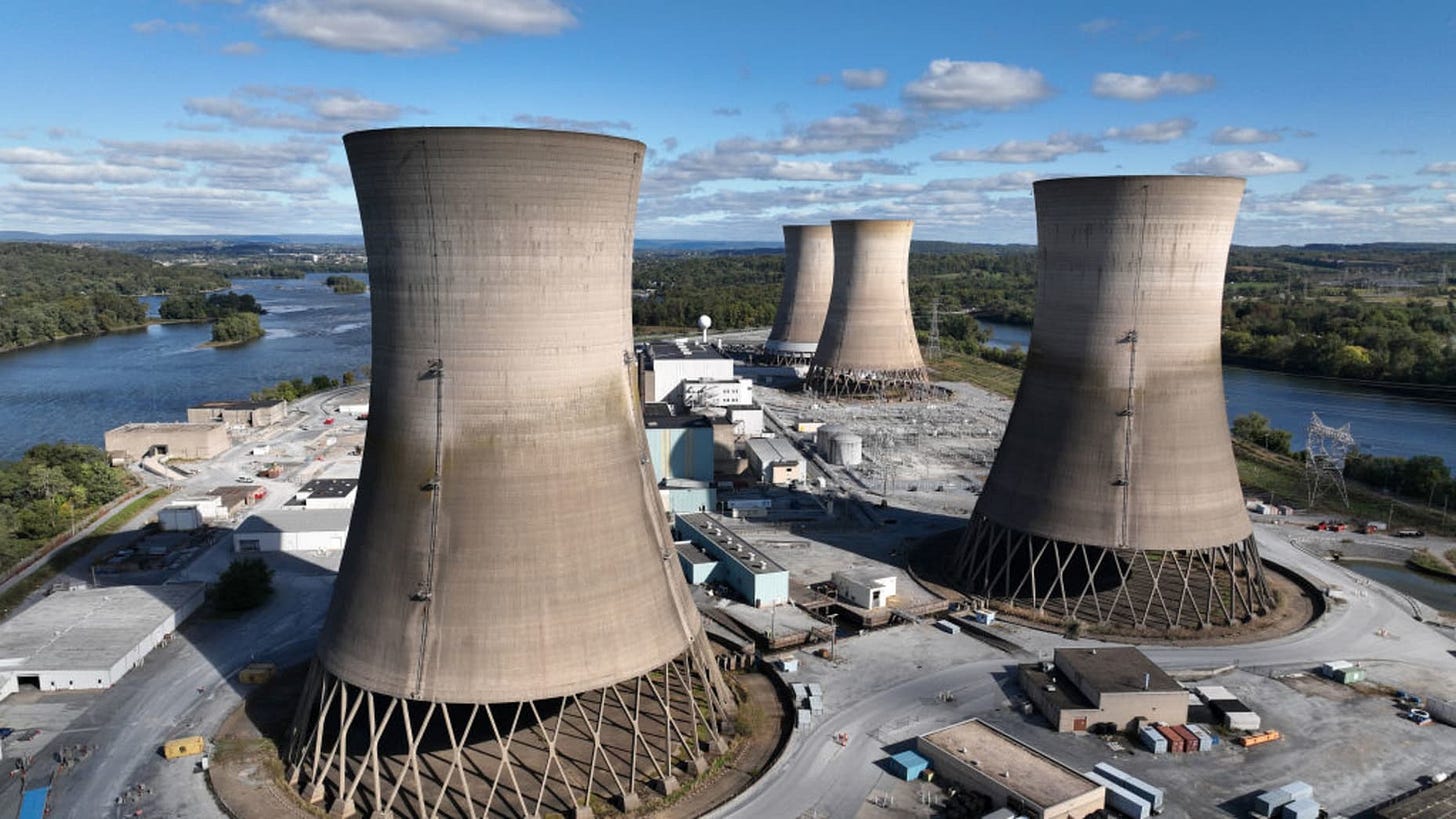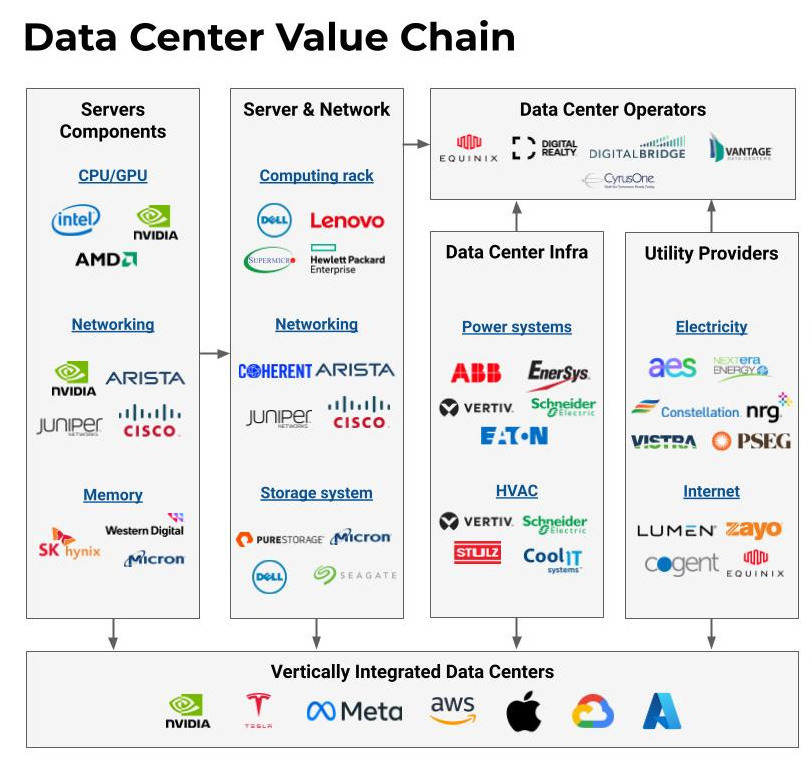2025: The Big Picture 🔮
What should hold our attention in AI, emerging, exponential and future technology?

While there are many 2024 AI roundups out there, I wanted to just briefly share what I’m watching as an emerging tech analyst around Generative AI and other exponential technologies that might direct some of my writing in 2025:
Trendline
8 Minutes 53 Seconds
🟠 Because who doesn’t like a bullet-point list?
What I’m Watching 🛰️
BigTech Capex in 2025
The scaling of AI Infrastructure (datacenters, energy demands, etc…)
Test-time compute (inference phase) and LLM scaling laws
Evolution of text-to-video and text-to-music models and products
AI agents as Orchestrating tasks like additional employees; impacts on innovation
Generative AI, drone and robotics improvements in National Security, National Defense & military spending with emphasis on autonomous AI systems
China’s BigTech response to U.S. BigTech in AI products, tools and application layer apps.
Chain of Thought (CoT) “Reasoning” Models, Cost to Performance
OpenAI’s business model, challenges and opportunities (e.g. Advertising in ChatGPT)
Role of major corporations in Semiconductor supply chain: TSMC, SK Hynix, Nvidia, Broadcom, ASML, etc…
Emergence of AQ: AI and Quantum computing capabilities, overlap, opportunities
Quantum Error Correction advances towards practical and real Quantum Computers and developments in qubit approaches
Consolidations, exits, acquisitions and mergers in Generative AI startups
BigTech layoffs and layoffs in the technology sector broadly speaking
U.S. trade sanctions and export controls vs. China and trade retaliations in Geopolitics (U.S. exceptionalism trend)
AI Policy, regulation and alignment: theory vs. reality
Autonomous Vehicle roll-outs and very late Robotaxi Promises
Anthropic in Enterprise AI vs. OpenAI in B2C Consumer Gen AI products
Small language models (SLMs) and how on-device Gen AI evolves (i.e. mobile as more Gen AI native, e.g. Apple Intelligence)
Which AI Tools gain mass adoption and can ChatGPT hold its B2C chatbot monopoly
Generative AI and the future of Search with Perplexity, Search in ChatGPT, Google’s search innovations (Deep Search, SGEs, etc…)
The major Gen AI in Coding startups and how their products evolve to boost SWE productivity
Generative AI’s impact on media, social media and digital engagement, journalism and the attention economy broadly speaking
How does Nvidia’s GPUs and AI chip and datacenter related products evolve and how does its business diversify and move into new areas
How will Google deal with the drop in search on an internet with more search and research options?
Will Generative AI lead to meaningful and impactful Ed-Tech technologies and not just students trying to take shortcuts?
The Most Profitable Companies are spending more and more on AI Infrastructure and state of the art models

Added to this now BigTech is investing themselves in Nuclear energy and namely SMR powered Datacenters clusters and AI Datacenter campuses.
AI Infrastructure’s impact on the Energy Grid is being Underestimated
🔵 2025 Visions
Alex Kantrowitz (Alex Kantrowitz) looks at likely events in Tech in 2025.
Kenn So (Kenn So) looks at AI trends of 2024 with some interesting graphs.
Chantal Smith (Chantal Smith) shares some of Exponential View’s best articles of 2024.
Dr. Seth Dobrin (Dr. Seth Dobrin) shares meta trends he’s watching around AI implementation in 2025.
Ashu Garg (Ashu Garg) makes some fascinating Meta tech trends for 2025.
Lenny Rachitsky (Lenny Rachitsky) shared his year in review and his best articles in 2024.
Air Street Press’s December issue of Guide to AI section. Those monthly recaps are great reading via Nathan Benaich (Nathan Benaich).
Read Kenn So’s entire report:
Really good infographics in the Kenn So post about AI Trends.
I asked Charlie Guo for a major AI Trends rundown and it turns out he was already writing his.
🔴 The Vibes and Consequences
What I like about many of the lists I’ve mentioned and is they are easy to read, and useful to ponder moving forwards. Let’s take some time to appreciate where we are in AI history as a civilization. There’s good, bad and geopolitical now. How we navigate technology as a species now could have existential outcomes for our institutions, systems and the future of our societies.
🟢 10 AI stories that shaped 2024
By Charlie Guo of Artificial Ignorance
It's been the second year in a row of seemingly non-stop AI news, though perhaps fewer mainstream headlines than in 2023. The innovations have been more subtle but no less significant - AI has become more integrated into our daily lives, moving from novelty to necessity.
A year ago, the only GPT-4 class model was GPT-4 (Claude 3.5, Llama 3, and Gemini 1.5 didn't exist). There was no such thing as a "reasoning model" on the market. NotebookLM was a twinkle in a Google PM's eye.
But the landscape has shifted dramatically. Google bounced back with Gemini, and OpenAI transformed ChatGPT into a multimodal platform. Meanwhile, new players like Anthropic, Mistral, and xAI have solidified themselves as serious contenders.
So as we head into the final stretch of 2024, let's look at some of the year's biggest stories.
Honorable mention: xAI
Despite the constant stream of AI headlines, xAI burst onto the scene with a bang. The company raised $6 billion in funding from heavyweight investors like BlackRock and Sequoia Capital, doubling its valuation to $40 billion in just six months.
At the heart of xAI's ambitions is Colossus, a supercomputer cluster in Memphis that would make even the most hardened tech enthusiast's jaw drop. Built in partnership with NVIDIA in just 122 days, Colossus houses 100,000 of NVIDIA's most powerful chips. And they're not stopping there - the plan is to expand to a whopping one million GPUs.
10. World models
When it was first previewed, Sora left everyone speechless with the quality of its video generation. What's interesting about Sora, though, isn't that it can make slick videos - it seems to have a genuine understanding of how objects move and interact. This is known as a "world model”: i.e. a model capable of "understanding" how the world works, physics and all.
But Sora isn't alone in pushing the boundaries of world modeling. Google's Genie 2 represents a parallel breakthrough, creating interactive 3D environments that you can explore. What's remarkable about Genie 2 is its object permanence - if you hide an object behind another one, the model remembers it's there. Walk around to the other side, and that object will remain exactly where you left it. This might seem obvious to us humans, but it's a huge leap forward for AI.
9. Deepfakes
The Taylor Swift deepfake incident in January was a wake-up call for millions not yet acquainted with deepfakes. When sexually explicit AI-generated images of the pop star went viral on X (formerly Twitter), reaching tens of millions of views, the platform's content moderation system completely broke down.
The White House got involved, actors' unions sounded the alarm, and tech companies scrambled to patch their systems. Microsoft had to admit that people were exploiting their AI image tools and rushed to add new safeguards. And even though Congress has yet to pass meaningful deepfake legislation, California passed a suite of new laws targeting deepfakes, from election misinformation to sexually explicit content.
8. Data deals
Late last year, everyone suddenly realized that data was the new oil - and this year, publishers rushed to extract it. From Le Monde to The Atlantic to Vox Media, dozens of organizations signed licensing deals with OpenAI - the largest being five-year deals with Condé Nast and NewsCorp, worth hundreds of millions of dollars.
There was also a push from UGC (user-generated content) platforms - Reddit's $60 million deal to let AI companies train on user content, for example, sparked immediate controversy, with the FTC getting involved. Other platforms followed suit - Stack Overflow partnered with Google, and Tumblr started working with AI companies.
This gold rush is transforming the social contract of the internet. Publishers are setting boundaries about how their content can be used, and some, like HarperCollins, are sharing the wealth with authors. But as more platforms rush to monetize their users' content, we're facing tough questions about privacy, fair compensation, and who truly owns the data that trains our AI models.
7. Talent "acquisitions"
In 2024, Big Tech found a creative new way to gobble up AI talent. Instead of buying entire companies, they struck unusual deals that looked more like talent raids. Google paid billions to effectively kneecap Character.AI, taking its founders and a chunk of its workforce. Microsoft and Amazon pulled similar moves with Inflection and Adept, snagging their best people while leaving the companies as hollow shells.
These weren't typical arrangements - in fact, they seemed carefully crafted to fly under the regulatory radar. The tech giants called them "licensing deals," but the FTC launched investigations into both Amazon and Microsoft's deals. After all, if it walks like an acquisition and talks like an acquisition, maybe it is an acquisition.
This talent consolidation is happening on top of Big Tech's massive investments into AI startups. Amazon alone has put $6.25 billion into Anthropic this year - that's out of $8 billion total, and still less than the nearly $14 billion Microsoft has put into OpenAI. Going from the trend, the future of AI is increasingly in the hands of a very small group of very large companies.
More Articles by Artificial Ignorance
Lessons from 139 YC AI startups (S23)
Tutorial: How to make and share custom GPTs
The Chatbot Trap: Why AI products really need some better UX
The subscriptionization of AI: Navigating the paid AI landscape
The hidden side of Apple Intelligence









